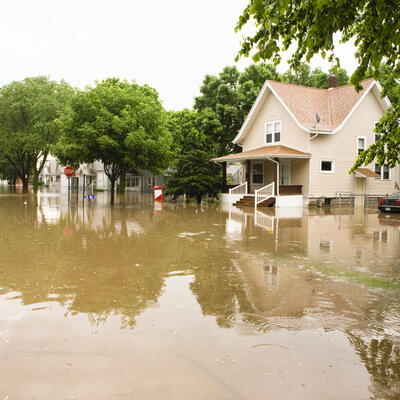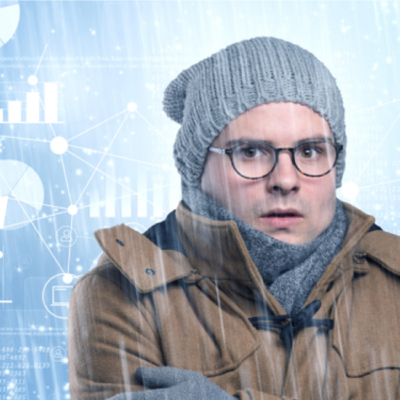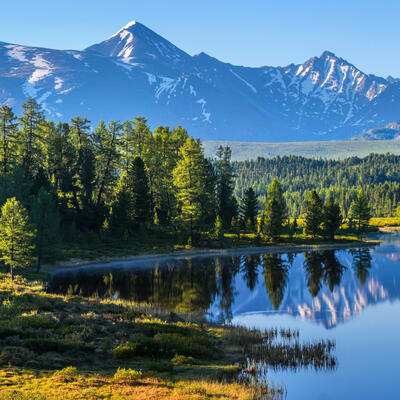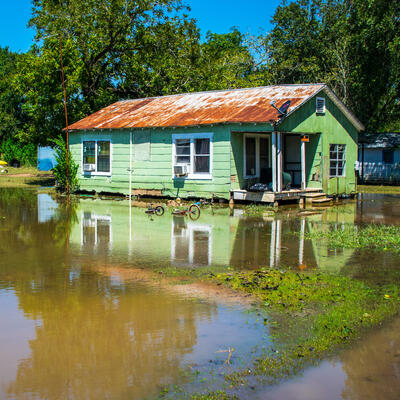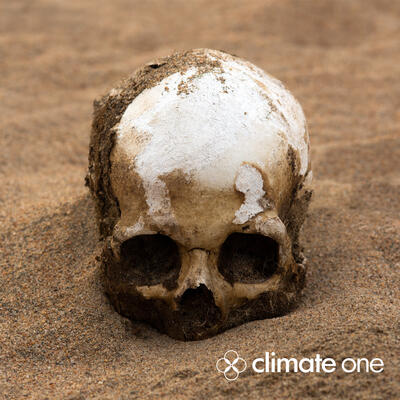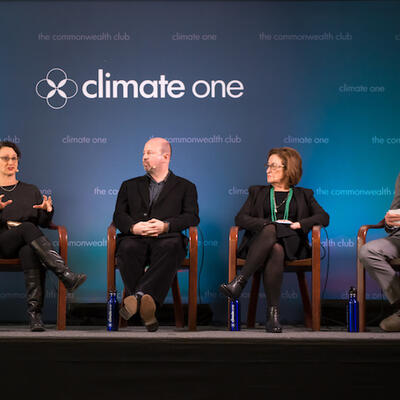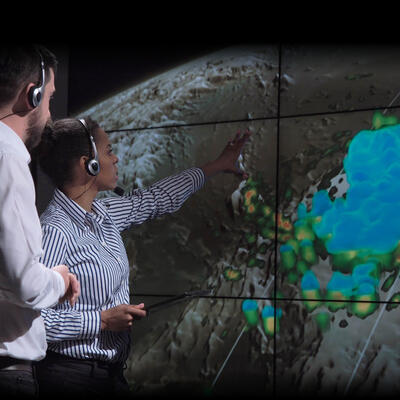
Temperature Check: Science, Texas, and Climate Chaos
Guests
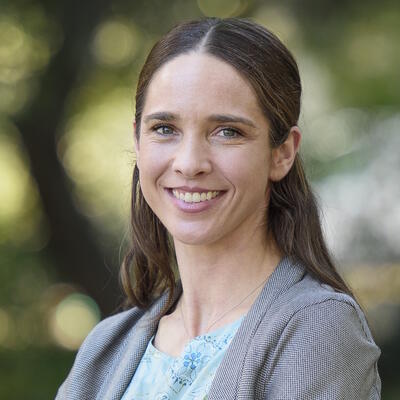
Katharine Mach
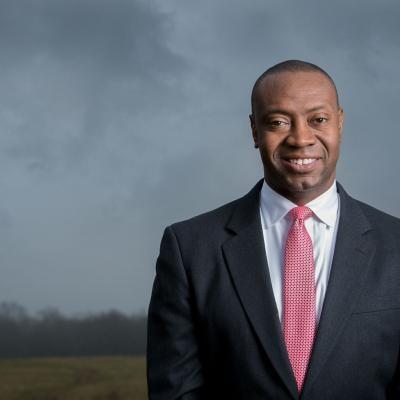
Marshall Shepherd
Summary
After months of dealing with a volatile political climate, it’s easy to overlook the actual climate, and how it’s impacting Americans daily. Just two months into 2021, deadly winter temperatures are killing Texans in their cars, rooms, and backyards and leaving millions without water and power.
“We had a compound event,” explains Marshall Shepherd, Director of the Atmospheric Sciences Program at the University of Georgia. “We had extreme cold that created its own public health issues, but then we had freezing roads that caused traffic issues, and then we had a power breakdown, and then we had water loss, so that's a multi-compound event there.”
Shepherd often finds himself in media interviews clearing up misconceptions about the polar vortex that caused the Texas deep-freeze, noting that it’s not an event like a storm or tornado but rather a normal feature of the atmosphere whose dynamics are changing as the planet warms. Those dynamics are complicated, but climate scientists like Shepherd are certain of the implications: more extreme weather.
“Hope or waiting and seeing is no longer a valid risk mitigation strategy,” says Shepherd, “that just doesn't fly anymore, our weather forecasts are too good.”
As a research focused on resilience and preparedness for the risks of a changing climate, Katharine Mach acknowledges that climate science is about more than atmospheric physics and chemistry.
“A lot of the science is actually figuring out what is the status of human response to the changing climate,” says Mach, “and that's stepping far from straight physics all the way through the human experience of the changing climate.”
Part of that human experience for Mach herself has involved confronting the unconscious biases that pervade the hallowed halls of science, and working to shape the system-wide dynamics for those who come after her.
“One of my students said to me at one point that she feels like she doesn’t really have to worry about these issues because she knows I have her back,” says Mach. “For me those types of moments are where it really feels worth it.”
Related Links:
Marshall Shepherd’s articles at Forbes
The Race Awakening of 2020: A 6-Step Guide for Moving Forward
Weather Geeks podcast
Behind the Scenes at the IPCC
Full Transcript
Greg Dalton: This is Climate One. I’m Greg Dalton. [pause] Climate change is not rocket science.
Katharine Mach: The mean increase in the temperature of the atmosphere is relatively straightforward science to figure out. What gets really complicated in a changing climate is the dynamics of the atmosphere.
Greg Dalton: But climate scientists know what those dynamics mean: more extreme weather.
Marshall Shepherd: Hope or waiting and seeing is no longer a valid risk mitigation strategy, that just doesn't fly anymore, our weather forecasts are too good.
Greg Dalton: So how will the latest findings impact our lives?
Katharine Mach: A lot of the science is actually figuring out what is the status of human response to the changing climate, and that's stepping far from straight physics all the way through the human experience of the changing climate.
Greg Dalton: Science and Climate Chaos. Up next on Climate One.
---
Greg Dalton: Is climate chaos due to a failure of policy, a lack of attention to science, or a combination of both? Climate One conversations feature all aspects of the climate emergency: the individual and the systemic, the exciting and the scary, people who are in power and disempowered. I’m Greg Dalton.
Greg Dalton: After months of dealing with a volatile political climate, it’s easy to overlook the actual climate, and how it’s impacting our daily lives.
Newsclip: A deep freeze is hitting large parts of America from North Dakota to Texas, forcing energy suppliers to impose rolling blackouts. That’s in an attempt to prevent the collapse of power grid networks.
Greg Dalton: While Texas recovers from an unusual polar vortex, California is preparing for another year of intense drought, and Wall Street financiers are moving their remote work to Florida, which is ground zero for flooding and sea level rise.
Katharine Mach: Places like South Florida are up there with so many major human settlements right on the water's edge where these questions of how will we get from where we are right now to a world that is resilient and safe with that amount of climate change.
Greg Dalton: Katharine Mach is Associate Professor of Marine Ecosystems and Society at the University of Miami, and an expert explainer about the connection between extreme weather and global warming. We’ll hear from her later in today’s show. First… about that brutal cold.
Marshall Shepherd: We had a compound event, because we had extreme cold that created its own public health issues, but then we had freezing roads that caused traffic issues, and then we had a power breakdown, and then we had water loss, so that's a multi-compound event there.
Greg Dalton: Marshall Shepherd is the Georgia Athletic Association Distinguished Professor of Geography and Atmospheric Sciences at the University of Georgia. He’s noticed three things that most people get wrong about climate change and the polar vortex.
Marshall Shepherd: I was doing quite a few interviews with the media, and one of the things that I noticed is this idea that the polar vortex is something that comes to get us like a storm or a tornado, when in fact the polar vortex is essentially always there, it's this sort of fast moving river of air up near the Arctic that's sort of circulating around the pole. What happens is, at times it gets disrupted or weakened and then you get cold air losing or spilling into the lower 48, so it's not the storm or Arctic or Arctic tornado that comes to get us, it simply is a dynamic feature of our atmosphere, narrating body, other planets have polar vortexies, by the way. So that's one thing that people get wrong, the other thing that people get wrong is that they talk about polar vortex and climate change, and there's some misconceptions as this caused by climate change was the cold event and the Dallas power out of... Just caused by climate change, and I don't like to use that framing, I co-op in a report for the National Academies of Science a couple of years ago, and we talk about that we need to get that out of our dialogues and talk more about the events like that are more likely or become more intense or frequent because of climate change, because I can't identify the 368th home run that a baseball player using steroids. I can't identify the at 368 home room was caused by steroid use, but I can certainly look at his statistics and is the length of his home runs a number and see that their steroid use, and so that's how we talked about framing that particular argument and the third thing that I often talk about is that we're going to have winter all of the time, because we live on a planet is tiled and rotating around the sun, so when we're tilted away from the sun, we get cold air, and so we'll have these cold events and they will happen from time to time, we have to understand how the anthropogenic climate change we certainly are experiencing on this planet interacts with our naturally vary in climate system.
Greg Dalton: And one scientist calls the polar vortex, like a chain-link fence containing a group of animals and some of them escaped some time, How is climate change affecting that fence at the top of the world.
Marshall Shepherd: Well, it's an emerging area of research and climate science, but the idea is that people like Dr. Judah Cohen and others, the Jennifer Francis who studied, if more closely than I have, there's some indication that we're seeing these extreme outbreaks of cold more frequently. Iit seems that they happen every other year or so, but in recent years, they seem to be happening every year, and there's been some scientific studies that link that to a sudden warming in the stratosphere, we call them sudden stratospheric warming events and the sudden stratospheric warming events do some complex dynamics lead to a weakening or a disruption of that polar vortex, and so when it is weakened, it is like that chain link being breached and all the little dogs are her cows or sheep run out of that little opening in the breach, well, when it completely breaks through, then they can all spill out, and that's kind of the analogy to this cold air, it's kind of fenced into the Arctic, but once it breaches that cold air can spill into the US with these sort of high amplitude Jetstream patterns. So to me, the way I explain this to my students is that I spent 12 years in my career at NASA'S in our system scientist before going to the University of Georgia. And I talk about, we think about the earth as a system. And so we can't understand climate change unless we understand changes in the Arctic or in these ocean circulations are in the biosphere, the green ocean, the Amazon, and so forth. So it's just one of those sort of complexities of the earth system that we're candidly learning about on the fly, I don't know if that's a good or bad, it could be dangerous actually, but there's so much that we're seen learning because we now have observing systems from space satellites, submersible systems, argues and so forth, that can tell us more about these things that we didn't have 30 or 40 years ago.
Greg Dalton: Another complex system is the human brain, and your unregulated electricity markets and Texas contributed to a grid that was not weatherization, legislature and coastal Americans have had fun sneaking at Texas the last couple of weeks, but there's a broader point about humans not being very good at calculating extreme weather risk that goes beyond Texas. What is the Texas debacle illustrate about the optimism bias?
Marshall Shepherd: Yeah, it's something we deal with in weather and climate quite often, optimism bias, recency biases and so forth. I saw it, I see it all of the time whenever we had 30 named storms in the Atlantic hurricane season this year, and that comes to mind because you always have people, that's how I've lived through three hurricanes, I'm not leaving, I can live through this one again, and that's an optimism bias, because you probably haven't lived through an anomaly event, I heard people in Houston after Hurricane Harvey, you're saying... Yeah, I was caught off guard because we get all the time... It rains a lot in Houston. Yeah, but you don't get 50 inches of rain in four or five days, that's an anomaly event, so people's optimism biases, don't prepare them for Anomaly events, and so this cold event that we saw in Texas, though it was an unprecedented coal, we've seen that level of call-before, it's still rare for them, so it's an anomaly to them, and so they weren't prepared now the weather forecasts were spot on, we knew days to week in advance that that was going to happen, and so there certainly should have been a bit more preparation. I always say these days that their hope or waiting and seeing is no longer a valid risk mitigation strategy, that just doesn't fly anymore, our weather forecasts are too good, but some of the preparation needed for our natural gas and our wind turbines and our water supply infrastructure require long-term planning. They're not things that can be done in a week or two weeks. We need to sort of think carefully about resilience and what type of investments we as a jurisdiction or a city or a state or a nation or willing to make under the notion that we will experience new normal events that are going to test our infrastructure
Greg Dalton: Yeah, as Texas was freezing, I was reminded of the epic wildfires in the American West last fall with millions of acres on fire and electricity being shut off, businesses shuttered, food rotting, fires don't typically cause power outages hundreds of miles away, you write about such compound events, how can we get our heads around multiple systems going haywire at the same time.
Marshall Shepherd: This compound events is something I testified before the House Science Committee in Congress in 2019, and there was a lot of interest in these compound events. Now, compound events are defined differently by different scientists, but the way I use the term... I am talking about this event that we just saw in Texas, we had a compound event because we had extreme cold that created its own public health issues, but then we had freezing rose, it caused traffic issues, and then we had a power breakdown, and then we had water laws, so that's a multi-compound event there, same thing with the fires, same thing with hurricanes, hurricanes are compound events, are... They're very notion because they bring destrfructive win, but then you could have flooding and storm surge issues that linger for a day or two, but then you could have public health or disease-related issues from waterborne disease in that standing water for days after the hurricane, and so I think this is something as I'm messaging to policy makers and stakeholders, not only do we need to be thinking about these climate-related disasters and extreme weather events that are upon us and will continue to be, so we need a fundamental planning policy structure and emergency response structure to understand a likelihood of more intense and multi-faceted compound event.
Greg Dalton: Right, it's amazing 'cause I had a friend in Austin who are like, Yeah, there's no water and you can't flush the toilet, there's just like one thing after a... Each one of those is bad, but you got three of them on top of each other, it's really, really tough meteorologists on local TV, or one of the few figures that progressives and conservatives both will still watch in this country, if they're often reluctant to mention climate disruption while extreme weather events are happening, you've coauthored reports on attribution of climate to severe, what are local TV weather caster is doing in terms of talking about climate, are they doing enough? Should they do more in real time?
Marshall Shepherd: Well, I think we've come a long way with that because even five years ago, if you'd ask me this, I'd say there's still a real problem with the number of TV meteorologists who are the only scientists that most people see every day, they don't talk to folks like me, but five years ago, I would say, yeah, there's still a problem with a lot of that community either being denied in denial or skeptical of climate change or just being unwilling to talk about it because they're worried about ratings or their own understanding of their ability to explain it themselves, but data from the American Meteorological Society journals that I've read and papers I've reviewed coming out of groups like George Mason University and a MA back and the folks, Yale suggests that the needle has started to move more and more. TV meteorologists are increasingly talking about climate change, and this notion that it will harm ratings and conservative areas, for example, has never been true, because some of the most effective TV medal... Just talk about climate change. When I think about people like John Morales in Florida, or amber Collins in Arizona, or Jim Gandy before he retired in South Carolina, these are very conservative states, but they talked about climate change and they were the leading TV meteorologist in their markets, and so that they disproved this idea that you can't talk about climate change, Mike melts and is a meteorologist in the Denver, Colorado market that just released and help standing look about climate change, a little simple book, very consumable readable by the average person, so I think we're seeing the needle move. I will agree that I would like to see a bit more sort of discussion amounts or real-time sort of implications related to possible climate change or attribution, and I think we'll get there. I think organizations like Climate Central and the information as they feed out to TV stations is helpful, and I think there's some other organizations that are emerging that are helping in that regard to.
Greg Dalton: I think the next frontier, if you think about the structure of local newscast as kind of the latest crime and then it goes to sports and whether the next frontier would be to get the sports journalists to talk about it... I thought about that when the NHL held an outdoor hockey game near Lake Tahoe and the Sierra Nevadas in California, and they had to stop it because the sun... This is February, the sun is so hot and it's melting the ice outdoor, and it wasn't safe to play on, and climate is affecting sports, it's affecting tennis tournaments. And you're the Georgia Association, distinguished Professor of Atmospheric Sciences at the University of Georgia, you know this.
Marshall Shepherd: You know, it's funny, I just hosted a podcast for The Weather Channel, and we interviewed a colleague of mine that's on the Olympic Committee, weather planning committee is or thinking about the summer living in Tokyo and the heat that's gonna be one of the hottest places that we've seen an Olympic event. Set of events and there are some concerns about the heat there and other things, so... Yeah, it's just... Climate is in weather. Literally or one of those things that touch everyone's live, that's why everyone talks about weather and climate, and that's why candidly, sometimes me as an expert in weather and climate get opinions from people who aren't experts because they feel they know whether they live, whether they're experienced weather and so I guess as of that, they feel that they can offer their pains on forecasts and climate change, you know, I get opinions in the mall or at the local fast fast-food that I'm sure no nuclear engineer ever get from someone walking up to him leisurely.
---
Greg Dalton: You’re listening to a Climate One conversation about science and climate chaos. Coming up: implicit bias and systemic racism in the (hallowed) halls of science.
Marshall Shepherd: I had a former student of mine tell me flat out, he said there was a faculty member at his old university said, Oh, Marshall Shepherd has succeeded because of his color. That's not the case. When you go back and look at my contributions.
Greg Dalton: That’s up next, when Climate One continues.
---
Greg Dalton: This is Climate One. I’m Greg Dalton, and my guest is Marshall Shepherd, Professor of Atmospheric Sciences at the University of Georgia. Dr. Shepherd is part of a new research effort in Atlanta, exploring the connections between race-based segregation and increased exposure to harmful heat, in communities of color. He explains what they’re hoping to understand.
Marshall Shepherd: Well, first of all, I'm an African-American scientist, and I've had my own sort of experiences in that regard, I would like to share that I wrote a book in 2020 called The Race awakening of 2020, A 610 guy for moving forward, and I didn't write that from the lens of the scientist, I wrote it from the lens of a black man in this country that has a black sun and watching the George Floyd incident, and so I was just very concerned about it, and so I had white colleagues, I had colleagues from other races saying, Well, what can we do? This really is an awakening for me too. I haven't really focused on race as it relates to weather and climate, much in my career, most of my careers focuses on things like extreme precipitation, Urban Climate, hurricanes and risk vulnerability and so forth, but in recent years, one of my areas of expertise is... Or been climate and well-versed in this notion of urban heat and Urban heat islands and distributions of head and where people live, there was a study that came out last year that suggested that historical red lining associated with discriminatory practices and lending and insurance and so forth. Had created these places in cities where marginalized populations are more likely to be exposed to heat, and you got to double sometimes triple whammy and heat because you have the urban heat island, and then you could have during the summer time I heat wave. And then the broader warming associated climate changes, and so there are people we think and hypothesize are disproportionately exposed, and so we were funded by the university through a series of race-based scholarships that they funded to look at this and so we have an urban geographer in is to listen to me and atmosphere scientists that will look at sort of how race is distributed in terms of housing and populations in the city of Atlanta, of surrounding areas, and whether there's a disproportionality in terms of how they're exposed to heat
Greg Dalton: Urban heat island, we should maybe explain that, that's the idea that there's concrete and asphalt that absorbs and radiates heat and there's fewer trees in these neighborhoods, so that I get that right in terms of a less shade, more surfaces that absorb and radiate key...
Marshall Shepherd: You got it right. And that I'd add to that, it's not that it's just less shade because the cities tend to have less trees, there's less of APO transformation as well, a floras formation, like evaporation from our skin, cools the air, and so when you have less of applets formation, there's less cooling in that process, in addition to the radiating surfaces like asphalt and concrete, and then there's another term which we call the anthropogenic, he term to... You ever stood by as a bus goes by, you can feel the heat to associated with the engine or the buses that goes by, so these additive terms lead to this disproportionate heating anomaly or urban heat island and cities compared to suburban and rural areas, and so that's exactly what we're talking about. And like I said, we want to investigate how people are distributed in the Atlanta and surrounding areas as compared to the heat island signature that we can measure from observations we take with meteorological instruments or even from satellites.
Greg Dalton: I was flying into Portland a while back and saw white roofs all over the place, that's one of the responses to that effect is to bounce the head back rather and absorb it on the rooftops. You were the first African-American to receive a PhD from Florida State University, Department of meteorology, one of the nation's oldest and respected. You were the second African-American to provider of the American Meteorological Society. What were some of the biggest obstacles you ever came breaking into scientific circles dominated by feared white man... Well, you
Marshall Shepherd: Know the biggest one came in when I was a child, I was always, it's interested in Science, particularly weather, but there were no scientists for... I just spoke to a young man this week via Zoom about his interest in our field, I don't have any of that, there were no scientists that I felt like that I could have access to or reach out to, or even resembled me.
Greg Dalton: Neil deGrasse Tyson wasn't out there yet.
Marshall Shepherd: No, he wasn't. And even still, he wasn't in weather and climate, so I just read books about Dr. George Washington Carver, who was an outstanding scientist, I did a lot of really neat things with pets, that was an initial challenge right there, as you get a little older and you go through, you start to... And this is still a big challenge for young scholars, African-American people of color, you sort of have to deal with this notion that, you know, yeah, he's there because he's black, or he doesn't really took my job or... Yeah, it really is. Observed either. And there's this in window about, why are you a scientist, a master, how did you become this or... So you always know that that underlying God is there in some people's mind, not, not all...
Greg Dalton: Do have to be better. Did you have to be better to...
Marshall Shepherd: You don't have to be, but I think there's a chip on your shoulder to... Tobii think that's an unfortunate by-product that many of my colleagues feel exactly that way, that they have to be better because, you know... Look, I had a former student of mine tell me flat out, he said there was a faculty member at his old university said, Oh, Marshall succeeded because of his color. That's not the case. When you go back and look at the fact that I've published over nor the publications and have been recognized at the White House and the fellow of The American Neurological Society on my contributions... But that's out there. I wrote an article in Forbes, this climate skeptic thread was out there on email, and one person on that thread decided to email me and complain about something I wrote in forms, but he forgot to remove the entire thread email threaded. So I was able to see some of it, and one of the comments that said, Yeah, yeah, Marshall shepherd is the token black that's using climate change to advance his career. And so these were people that I walked the halls of. Conference conferences, I was... I used several of people in that thread, and they don't know I know, but I do know. And so I carry that with me. So those are challenges as President of the AMS, I was standing in the conference hallway of the hotel conference... Lobby of the hotel where the conference is being held, I should say, with three or four other present former presidents of the AMS, and the woman comes up to me and ask if I was the airport shuttle tracer because we all had suits on, So there's that very explicit thing, and then there's the micro-aggressions, and I write about actually in my book, where people come up to me and say things like, You're such a credit to your race, or you're so articulate and you speak so well after that lecture, talk to many of my colleagues and said, I've come off stage and never had anyone tell me our articulate I was... Or, why do I need to be a credit to my race? And so those are out there, gender, gender-based micro-Grossi, they're microaggressions from many different perspectives, so it's one of those things that I wrote about in the books, other people aware of them, because a lot of times people are... Doing them thinking they're paying your compliment, but they're actually back-handed microaggressions, they don't realize...
Greg Dalton: Climate is getting a lot more attention now that by demonstration is looking at every policy issue through a climate lens, how are you feeling about the prospect for a meaningful progress on stage likely the climate... Now, there seems to be sort of an upswing, I'm wondering if you're feeling as optimistic as I am...
Marshall Shepherd: Well, you know, it's interesting, I might have a different take on that. Yeah, I clearly see that the Biden administration is going to attempt move the needle at the federal level, and we're coming out of sort of a dark period for the last four years where we pulled out of the client parasite agreement and EPA was under attack, and so forth, but the reason I say I might have a slightly different perspective is that even in the last four years, I was still encouraged by the activity that I saw at state and local levels from faith, faith organizations, from the private sector. So I would often tell people that even though things look bleak in the federal sector, there are a lot of good things that are happening, draw down Georgia project, drawing out a lot of different things that are happening that were good, even in the midst of that, federal chaos that we saw in the last four years, so what I'm optimistic about is I think the buy-in administration is going to continue to keep climate as a front and center issue, they are thinking about climbing in a cross-cutting manner, so you won't see this administration just talking about climate and the science agencies like No, our EPA or NASA, they're thinking about climate from the perspective, the Department of Agriculture, Housing and Urban Development, and Health and Human Services, so they understand the cross-cutting major of climate. And I think that's one thing that the bit that's going to be a signature and the Ryan, the administration I'm quite pleased with. I think they're gonna really think carefully about the equity issue, will probably try to move the needle on renewables a bit more than we've seen in the past, and protect our federal lands and from things like drilling for oil and things like that. So there are certainly things to be excited and optimistic about, but I think there were some hint of optimism that may have been missed that different levels as we were so dismayed by what was happening at the federal level.
Greg Dalton: Marshall Shepherd, Georgia Athletic Association, distinguished Professor of Atmospheric Sciences of the airforce of Georgia, and host of the weather geeks podcast. Thanks for coming out and climbing on, it's a pleasure to talk with you. I feel better, I feel appropriately afraid and appropriately optimistic at the same time, so thanks for sharing your insights today.
Marshall Shepherd: Hey, thank you for having me.
---
Greg Dalton: You’re listening to Climate One. I’m Greg Dalton. As Marshall notes, micro-aggressions and other (unconscious) displays of power and privilege can take many forms.
Katharine Mach: One of my students said to me at one point that she feels like she doesn’t really have to worry about these issues because she knows I have her back. For me those types of moments are where it really feels worth it.
Greg Dalton: Katharine Mach is Associate Professor of Marine Ecosystems and Society at the University of Miami. She co-directed the IPCC working group on climate impacts, adaptation, and vulnerability. Our conversation began by addressing a different kind of aggression, namely the Trump administration’s open hostility to science, and what effect the last four years have had on climate data and science.
Katharine Mach: There are a few different layers here. So first of all, there are places where climate science has proceeded, but it hasn't necessarily referred to climate change as directly, right. If many of the aspects of responding effectively to a changing climate, understanding what's happening come down to whether that is changing through time. In the current era that we've gone through some of that has meant that instead of being about climate change some of the same research has proceeded more with an emphasis on its relevance to weather. I think there are a lot of ways that federal agencies have not been unleashed to their full scientific capacities. I think there’s a relevant parallel with the pandemic. You could say before the pandemic occurred, the U.S. was at the top of the global rankings for preparedness to respond in a pandemic, which is all about science, federal institutions and policy coming together. We did not deliver on that. And I think there's a real parallel there for what it's meant for science in our federal agencies. And then those science questions they interact with the policy questions, but I do think that policy question has been where much of the backsliding has been unambiguous and stark.
Greg Dalton: The Biden administration wants to pass a big infrastructure bill. We've heard about infrastructure as the area for a bipartisan agreement for quite some time. As an expert on coping with climate risks. How should the administration think about rebuilding America's bridges and roads in a climate smart way so the money is wisely spent?
Katharine Mach: Wonderful question and one that I think about a lot especially thinking about infrastructure. For example, in South Florida where the risks from sea level rise are real-time and also pronounced over the decades to come. There are a few different entry points, you know, one is the degree to which our preparedness for a changing climate comes down to our current starting point. So, where we've got infrastructure in this repair levees ready to fail, roads that aren’t where they should be. All of those mean that the challenge for ensuring preparedness as the climate continues to change is even a bigger challenge. Then there’s the next challenge of many of the major infrastructure projects occurring now or in the next decade may will have lifetimes of many, many decades. And especially for something like sea level rise and the instability of the ice sheets whether just really important uncertainties there. The question for infrastructure is not necessarily planning for what will be the most likely future in that robust planning is will that infrastructure whether it's a road or a bridge or a septic system still function across the full range of possible climate features that we might see of the decades to come.
Greg Dalton: Right. I remember talking to the person responsible for protecting downtown San Francisco. There's a seawall that is not earthquake safe and she said, no scientist can tell me how high by what year we should build the seawall to protect hundred billion dollars in property downtown San Francisco. And I thought of it kind of like Lego you have to like build a seawall where you can like add another row of Lego on top of it, as the seas rise because it's so uncertain. But people making decisions need to know how high do we build the seawall how high do we raise that road, right, and it's hard to say.
Katharine Mach: I love the Legos analogy there. So, I think the scientific counterpart to Legos has been an increasing emphasis on methods that are all about making good decisions in the face of uncertainties that exist. And the future is always uncertain. Which school does a kid go to? Does a couple get married? Which house do they buy? Right. These are all decisions under a lot of uncertainty. And so, the fact that climate change involves uncertainty really isn’t unique to climate change. And the really cool thing is that that means that good science for decision-making is about the methods through which that science can inform decision-making. So, kind of the s cientific counterpart to Legos, you know, you could point to something like adaptive pathways. So, the Thames Barrier protecting the city of London is one of the first pieces of infrastructure globally to have this pathways approach be developed. And the basic idea is that it's pretty hard to say exactly when the world will see two additional feet of sea level rise or three or four. All of those numbers are very likely under many of our possible climate features. It's a question of when that would occur. So, for something like the Thames Barrier or you could say downtown San Francisco, what you might want to do instead of pegging it to the year, at which a given amount of sea level rise would happen, you would peg against the amount of sea level rise that’s happened. And you also know if you go from the current height and add your layers of Lego seawall as a new extend the seawall how long does it take to make that adjustment. And are there any adjustments that would create a path dependency where it's hard to reverse them. And so, the pathways approach is basically saying where the societies want to go what is a regional priority for responding to sea level rise for example. And what are the ways that as sea level rise continues through time preparedness options are all about making sure we’re responsive to the amount of sea level rise that does occur, recognizing that right now it's very, very hard truly impossible to say exactly how much sea level rise will happen a century out for example.
Greg Dalton: What are some other new advances in climate science that you find intriguing? What are some new science breakthroughs or the things that people might not know about if you don't read scientific journals?
Katharine Mach: So, one has been as climate change increasingly is not something hypothetical far off in the future, but something where we're seeing whether it's smoke from wildfires or the amount of rain that comes down in a storm. We’re seeing intensification of risks right now. And often times which really hard to manage in real time is not necessarily the most direct aspect of just how much water enters into the system. It's the cascades, does the road system get blocked. Does your communication system go out? Have you had to drop power on the lines to prevent the outbreak of a wildfire or to respond to heat simultaneously? And those cascades that complexity increasingly is squarely in the space of science as well. So, a lot of the physical climate science is saying. Okay, let's not just study heat temperature in isolation. It's important to recognize that the impacts of heat are often heat and humidity and combination. So, putting those together for example. Or that it's not just a question of a hurricane coming onshore it's what's the storm surge associated with that is it on a high tide, how fast does that storm moving. So, oftentimes this complexity is increasingly coming into space of the physical climate science and then absolutely the impact of science. And so, that kind of comes back to what we are talking about in terms of science relevant for society that complex part of climate risk is really crucial to what people have to deal with when something goes wrong. So a lot of the science is actually figuring out what is the status of human response to the changing climate, and that's stepping far from straight physics all the way through the human experience of the change in climate.
Greg Dalton: So, what’s the headline there? Is humanity getting ready are we kind of doing the kind of insulation preparations? We know that we were prepared but didn't do so well on COVID. How are we doing what's the scorecard?
Katharine Mach: There is a lot of planning happening. There's a lot of early-stage action but in terms of actual adjustments being made they are underwhelming. And I think in the U.S. we can say this is pretty intuitive. The number of billion-dollar disasters that we experience in any given year has gone up over the decades passed. It’s not something where we really turn the tide on damages from climate in a changing climate. But the neat thing is by actually being able to say most action we see globally has been surprisingly kind of around the edges and incremental creates a really crucial starting point for making sure that investments moving forward increasingly push towards more fundamental improvements in just how prepared we are for changes in store.
Greg Dalton: So, it sounds like on the adaptation side as well as the mitigation side, things are going in the right direction. Steps are being made just not fast enough and not on the scale that's necessary.
Katharine Mach: Scale and speed. Exactly.
---
Greg Dalton: You're listening to a conversation about science, and policy, and society. This is Climate One. Coming up, bringing science back into national government.
Katharine Mach: I think it’s really important to recognize that these will never be separate spheres. There will always be values and some level of politics and science, and vice versa.
Greg Dalton: That’s up next, when Climate One continues.
---
Greg Dalton: This is Climate One. I’m Greg Dalton. My guest is Katharine Mach is Associate Professor of Marine Ecosystems and Society at the University of Miami, and we’re talking about the intersection of science and climate policy. The Biden administration recently announced it will look at climate impacts on human migration, a topic Katharine also thinks a lot about.
Katharine Mach: It’s important to recognize that movement in a changing climate takes a bunch of different forms. So, one would be, you know, disaster displacement. I think all of us in the United States know the example of Katrina and the pronounced displacement that in many cases became very long-term or permanent. So, those types of disaster displacement are they temporary are they permanent? That's one form of the way that a changing climate affects the movement of people. Another one at the other end of the extreme would be deliberate decisions to abandon areas that flood again and again that are eroding into the sea that are washing into the sea as ice melts, permafrost thaws. And that space of retreat is also in the spectrum of movement in a changing climate. So, when we say how does climate affect migration or movement of people, it's really important to recognize that some of that in the space of disasters. Some of that the slow burn effects if an area gets drier and drier and more decertified through time and crops can't grow as well. A lot of those are open questions for the future. But I think what we know for sure is that climate already is entering into the suite of factors that influence movement from displacement to migration to retreat. And increasingly into the future the numbers get a lot bigger whether it’s sea level rise where that geographic footprint is so clear where fire where the risks tends to be uneven across very large swaths of territory. And the really important questions as to the ways in which the change in climate will intersect with local livelihoods. The safety of housing risk perceptions and when people will decide they prefer to be elsewhere.
Greg Dalton: Speaking of migration, you recently moved to the front lines of climate in Miami. How did you feel moving into the eye of the storm knowing what you know about what's coming to Florida?
Katharine Mach: I mean given that I focus on resilience and preparedness for the risk of a changing climate, you know, it wasn't an accidental choice. And honestly, it's been just incredible. I mean it is a region where climate change, sea level rise is in the current day and it's not just something where the scientist sees the issues in the science. These are floods that happen on the high tide. Art, Miami has a vibrant arts scene that something where you can say the yard signs, they’re about the risk of flooding, you know, to your front door. These types of interactions are just really, really powerful and one where the research I do can be very much in collaboration with the local governments the community-based organizations and the passionate young students who were very interested in making sure their research is actionable for all of these ongoing decisions.
Greg Dalton: Wall Street bankers are also moving to Miami a number of high-profile financial firms and billionaire investors are setting up shop in Miami. Are the climate risks to property and human well-being any higher there than Manhattan? When I first heard about that I was like oh god these are smart people they’re going to a risky place. Do they know what they're doing? Well, maybe it's not as risky as I might think.
Katharine Mach: It’s interesting and a theme where actually in the space of long-term risks and viability and what will the long-term game plan be. There are some important differences between Miami and Manhattan. You could imagine the New York story of adapting to sea level rise being one of rolling the city inland for example, among many possibilities. Where in Miami, you know, rolling inland isn’t gonna do it because sea level rise is very active on all sides of the Metropolitan greater Miami area. And so, yes in Miami, you know, there are billions of dollars of assets within 3 feet of the current high tides. There is a big effort in putting together the pieces of yes keeping out storm surge, but recognizing that with a porous limestone bedrock the water comes in through below, so to speak. And this is about the viability of septic systems and roads that are increasingly submerged and cars that are increasingly exposed to salty water. And a world of continued high emissions of heat trapping gases really could mean four maybe eight plus feet of sea level rise in the century ahead. And in those types of worlds places like South Florida are up there with so many major human settlements right on the water's edge where these questions of how will we get from where we are right now to a world that is resilient and safe with that amount of climate change. Those are some of the major open questions.
Greg Dalton: The election of Kamala Harris as the first female vice-president is a huge milestone for gender equity in politics and has put a spotlight on the issue in other arenas. You wrote an article about women in science when you were a PhD candidate and draw on your experience as a girl playing Little League on all boy teams. What was that experience like for you and how did it inform your career in science?
Katharine Mach: Yeah, a question that I’ve been thinking about for a lot of years now. And I guess I would say for me it was in graduate school where I suddenly realized wow there aren’t all that many senior women in many forms of natural sciences, especially. And what was funny for me is once I realized that it was kind of like a ding, ding, ding, ding, so many things came into focus. I realized, you know, in all of my undergraduate classes related to my major in biology I've had two female professors out 18. And I never even noticed but that was the ratio. And suddenly at the point where I was thinking about my own career in a longer-term sense where it jumped out. So, being rather academic I just started reading and obsessively reading it was so fascinating. And oftentimes that was what I would read late night rather than stuff relevant to my dissertation for sure. And I think what the numbers suggest is that, you know, the pipeline for a long time has been very leaky. The number of women at the PhD level does not translate for decades now. And the number of women in senior faculty positions leadership positions. I think for me what was so profound about really looking into what the data say about women in science was first of all, very quickly realized that this was, not at all confined to an issue of women in science. The barriers for people of color are even more stark. There is not a very open culture in many natural sciences in particular around LGBTQ plus students. Issues of inclusion are really multifaceted. And as I kept reading, you know, I was like, wow, what did I do picking a career in science. But then at some point I realized actually these are the same dynamics in so many professional realms. And in this weird way, almost going full circle saying I started with women in science thinking broadly about who's in the academy and why and what their experience has been and recognizing finally that oh, this is happening everywhere. In a weird way it was very empowering and one that I’ve really carried with me and recognize that increasingly through the course of my career as I get older and older, I have more ability to shape the experiences the systemwide dynamics for those who come behind me. And one of my students said to me at one point that she feels like she doesn’t really have to worry about these issues because she knows I have her back. For me those types of moments are where it really feels worth it.
Greg Dalton: And on the Little League your experience playing Little League as a girl on all-male teams, you lead the league in doubles, but also had a more dubious honor. What was that was it intentional what do you take from that that you apply to academia. What do you take from that Little League field and tell us what that honor was?
Katharine Mach: Yeah, my dubious honor was I was hit by more balls from the pitcher that skewed off course and struck me than anyone else in the league. And it was kind of this funny experience where I mean I can almost kind of feel that being the only girl in the field could understandably make a pitcher nervous. And for me I think the interesting connection there to draw to my experiences as a scientist is actually how so much of what goes on in terms of inclusion for women or people of color can be unconscious. You know these kind of implicit biases that we all carry, I, likely I know I carry biases against other women in science, which feels crazy. But you can take these implicit association tests and realize that most stereotypes that exist as a social phenomenon in our societies, we tend to internalize unconsciously and they affect the types of judgments we make. So, an inclusive environment is one that's responsive to, yes, the official policies in place but also an environment that is one of mutual respect. So, these types of little accidental micro aggressions essentially aren't a dominant part of the experience.
Greg Dalton: The pantheon of climate science is the IPCC, the global group of climate scientist which is only been led by men. You worked at a high level within the IPCC how male dominant and inclusive is that culture?
Katharine Mach: Yeah, there are a lot of different angles I could take on this question and it’s definitely one I’ve thought about a lot. I mean I think in a simplistic way you could say as you go from the lead authors the bulk of who shows up to the science team to the coordinating lead authors to the cochairs of each working group to the chair. It’s a little bit of a pyramid where there historically has been fewer women at every rung. So, that’s an unambiguous part of it. I also think that for the IPCC the global context of who’s at the table is really pronounced as well. So, as a woman where English is my first language and I’ve been embedded and fully funded to do climate change science at top-tier universities recognizing that I actually had a lot of privilege in that context. And the questions of inclusion in a context that is so global go far beyond gender even though gender is an important part of that. I think in a way some of the aspects of the governmental side of the IPCC for me were really inspiring. In that it's an environment where it's about consensus it’s about hearing all voices. And you might be hearing those voices all through the night multiple nights in a row during those government approval processes. But it's really remarkable example of the diversity of perspectives really nattering on these issues.
Greg Dalton: Bill Gates is out there talking about climate these days. And one of his main points is stabilizing the climate will require unprecedented collaboration across disciplines and national boundaries. Do you think men are as good to that, do we need more women to do that or men, can we count on the men to do that kind of collaboration that hasn't happened before?
Katharine Mach: Lot of angles here. I mean I guess one question and distinction would be the science underpinning for societal actions and then policy itself. And I think making sure there's diversity in both of those groups is crucially important for the science side. Why can people trust science it's when it’s a whole of perspectives diversity inherent open to criticism open to revision and peer review and improvement of that understanding through time. So, in that case, if it's only a few people asking the questions we can be pretty sure they won't be asking all of the relevant questions and bringing in the full suite of disciplines that are relevant. On the societal side, I think it's an issue of climate being something that affects basically all communities and all countries on planet Earth. And if you're only tapping 50% of brainpower you're certainly missing out on the capability side of things, but also what it means to have messengers in the space of policy that resonate with all communities. And if you're narrowing your group of leaders and messengers and scientists, we’re not going to get everyone at the table working together full force ahead which is what we really need in the climate issue.
Greg Dalton: You’re mentioning the disciplines that climate conversation is anchored in chemistry and physics, but the behavioral sciences such as psychology and sociology are also coming into play as societies grapple with changing human behavior. Do you think social science gets enough attention in climate conversations and funding?
Katharine Mach: I think we’re at a point right now where there is clear understanding that the basics of climate science have been understood, you know, frankly for decades you can even argue more than a century. And we’re not necessarily seeing deep attention to responses or we’re seeing growing momentum but not necessarily enduring change in line with what's necessary to keep people safe. And so, all those complexities are about the human side of the picture. How are the risks of a changing climate perceived? Why do people move to a location that's within 1 foot of the high tide watermark? Some people don't care about these risks. That’s actually environmental psychology more than it is necessarily a strict sea level rise question. Governance, political science, environmental justice. These are all very, very real aspects of how societies choose to respond in a changing climate. I think to your point about are the social science getting enough attention in climate conversations and funding. Some of the major federal mechanisms for funding climate research are increasingly focusing on connecting disciplines and co nnecting science with society and doing it really, really well such that it's not just something where you'd say scientist, was this a cool science experiment. Did you have a major breakthrough that you publish in nature, but instead it's about partnerships in the research process where the full set of experiences of the partners in government or nonprofit focus on social justice are evaluated as much as the perspectives of what the strictly speaking scientific outputs were. So, that is starting to change and I think it's something that is here to stay.
Greg Dalton: Katharine Mach is Associate Professor at the University of Miami. Thanks for coming on Climate One.
Katharine Mach: Thank you so much, Greg. Really nice to talk with you.
---
Greg Dalton: You’ve been listening to a Climate One conversation about science, policy, and society. You can hear more by subscribing to our podcast on Apple, Spotify or wherever you get your pods. Please help us get people talking more about climate by giving us a rating or review. It really does help advance the climate conversation.
Greg Dalton: Kelli Pennington directs our audience engagement. Tyler Reed is our producer. Sara-Katherine Coxon is the strategy and content manager. Steve Fox is director of advancement. Devon Strolovitch edited the program. Our audio team is Mark Kirchner, Arnav Gupta, and Andrew Stelzer. Dr. Gloria Duffy is CEO of The Commonwealth Club of California, where our program originates. [pause] I’m Greg Dalton.
